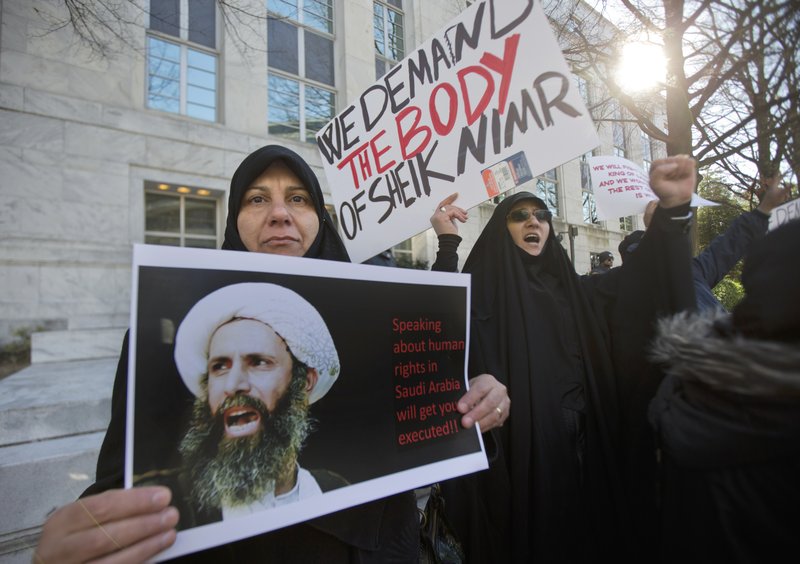TEHRAN, Iran -- Iraq on Wednesday offered to mediate between Saudi Arabia and Iran after the kingdom executed a Shiite cleric and two Saudi diplomatic posts in the Islamic Republic were attacked by protesters.
Pakistan also said it is looking to play peacemaker when Saudi Arabia's top diplomat arrives in Islamabad for talks today.
The standoff has seen Saudi Arabia sever diplomatic ties with Iran at a time when conflicts in Syria and Yemen, where Riyadh and Tehran back opposite sides, continue unresolved.
Iraqi Foreign Minister Ibrahim al-Jaafari proposed mediation during a news conference in Tehran but also referred to the execution of Sheikh Nimr al-Nimr as a "crime." Saudi Arabia and its allies say al-Nimr was found guilty of terrorism charges, and that condemnations of the execution amount to meddling in Riyadh's internal affairs.
Iraq's Shiite-led government in Baghdad relies on Iranian help to battle the Islamic State extremist group but is also trying to repair ties to oil-rich Saudi Arabia, which last week sent an ambassador to Baghdad for the first time in 25 years.
Speaking alongside Iranian Foreign Minister Mohammad Javad Zarif, al-Jaafari said Iraq's place in the heart of the Middle East allows it to play a role in trying to "alleviate tensions."
"This responsibility has been given to us and we have been active from the early moments to lessen tensions to prevent a disaster from happening that could affect the entire region," he said.
Late Wednesday, President Barack Obama spoke by phone with Iraqi Prime Minister Haider al-Abadi. The White House said both leaders agreed in calling on Saudi Arabia, Iran and any mediating parties to show restraint and avoid inflammatory actions.
In Iraq, however, thousands of Iranian-backed Shiite militiamen marched in Baghdad and across the south to protest the execution of al-Nimr. Qais al-Khazali, the head of the powerful Asaib Ahl al-Haq militia, gave a speech in the southern city of Basra in which he called on the government in Baghdad to cut diplomatic ties with Saudi Arabia, expel the newly arrived ambassador and boycott Saudi goods.
Russia also has offered itself as a potential mediator, though it's unclear whether Saudi or Iranian officials have responded to the proposal.
Zarif, meanwhile, blamed Saudi Arabia for exacerbating the situation.
"We have treated these actions with magnanimity and nobleness but unfortunately our neighbor, Saudi Arabia, did not respond to it properly," he said. "The process of provoking tension must be stopped."
Iran's President Hassan Rouhani accused the Saudi government of fanning strife between Shiite and Sunni Muslims and creating "an Islamaphobic atmosphere" in world opinion, according to a news release from Iran's U.N. mission.
At a Cabinet meeting Wednesday, Rouhani also accused the Saudis of providing money and weapons to "terrorists," carrying out airstrikes in Yemen and obstructing "the victory of Iraqi and Syrian governments," the release said.
Saudi Arabia and Iran have long vied for influence in Pakistan, with both countries forging links with radical groups and pouring money into Islamic religious schools known as madrassas. That has fanned the flames of extremism and fueled sectarian violence in Pakistan, which is mostly Sunni but has more Shiite Muslims than any country apart from Iran.
"We are at a very crucial stage of our battle against terrorism," Shah Mahmood Qureshi, a former Pakistan foreign minister who is now a deputy leader of a key opposition party, said by phone. "We can't afford disturbances as we need all these nations for bringing peace and stability to the region."
Sartaj Aziz, foreign-affairs adviser to Pakistani Prime Minister Nawaz Sharif, told Parliament this week that Pakistan was "a friend of both Saudi Arabia and Iran." He said the government would "try to bridge the divide and improve the relationship between the two countries."
The diplomatic standoff between Iran and Saudi Arabia began Saturday, when the kingdom executed al-Nimr and 46 others convicted of terrorism charges -- the largest mass execution it has carried out since 1980.
Iranian protesters responded by attacking the Saudi Arabia Embassy in Tehran and its consulate in Mashhad. Late Sunday, Saudi Arabia announced it was severing relations with Iran because of the assaults. On Wednesday, Iranian diplomats in Saudi Arabia returned to Tehran, according to state media.
Since Saudi Arabia severed ties to Iran, a host of its allies have cut or reduced their ties as well. Among those is Bahrain, which said Wednesday that it had broken up a Shiite militant group backed by the Lebanese Hezbollah and the Iranian Revolutionary Guard.
Bahrain's Interior Ministry accused the suspects of receiving $20,000 from Hezbollah leader Hassan Nasrallah and of having links to those behind a July 2015 bombing that killed two police officers
Also on Wednesday, Qatar recalled its ambassador from Iran to protest the attacks on the Saudi diplomatic missions, according to a brief report carried by the official Qatar News Agency.
Oman broke its silence on the Mideast turmoil and called the Saudi diplomatic post attacks "unacceptable," while leaving its ties to Iran untouched. The sultanate has been a longtime mediator between Iran and the rest of the world.
Information for this article was contributed by Ali Akbar Dareini, Jon Gambrell, Reem Khalifa, Susannah George and Joseph Krauss in Cairo of The Associated Press and by Kamran Haider of Bloomberg News.
A Section on 01/07/2016

